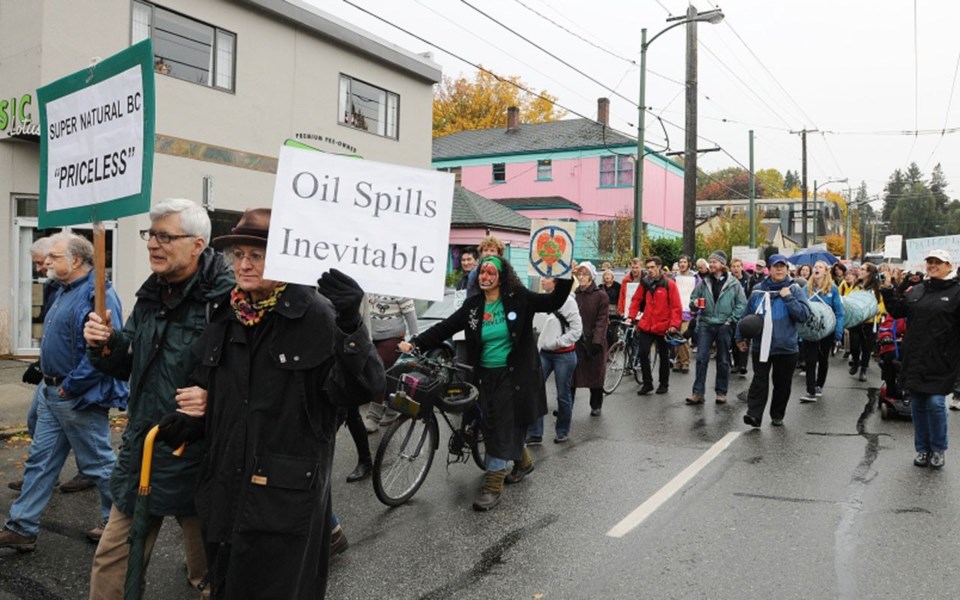A letter by Canada’s former Conservative government’s environment minister left Canadian environmentalists thinking they were under police surveillance and “enemies of the state,” newly released documents show.
The groups – among them Dogwood Initiative, ForestEthics (now Stand.Earth), Sierra Club BC, Leadnow.ca and the Indigenous #Idlenomore movement – said the fear of monitoring impacted their ability to fundraise, get petitions signed and organize protests.
“The minister of the environment Joe Oliver produced an open letter calling our group, and members of it, essentially ‘foreign-funded environmental radicals,’ and that caused quite a bit of alarm among our supporters and our community, and our staff,” Dogwood organizer Celine Trojand testified before a 2015 inquiry.
That probe was looking into allegations Canada’s spy agency, the Canadian Security Intelligence Service (CSIS), had targeted activists opposed to the Enbridge Northern Gateway pipeline and shared that information with oil companies.
While Security Intelligence Review Committee (SIRC) member Yves Fortier found CSIS had not overstepped its mandate in reporting on several activist groups, newly released documents paint a climate of apprehension and fear among those groups.
And while it remains to be seen where the direction to investigate the groups came from, Oliver’s letter appears to be a major concern found throughout the 8,555 pages of heavily redacted documents released by the BC Civil Liberties Association (BCCLA) said.
In addressing Fortier, the BCCLA said Oliver’s references to “environmental and other radical groups" threatening to "hijack" the regulatory system to achieve a "radical ideological agenda" that will "undermine Canada's national economic interest" gave rise to concerns that CSIS's powers were being used to target groups or individuals who say they were peacefully engaged in constitutionally valid activities.
Giving Fortier an overview of RCMP and CSIS activities was political scientist Reg Whitaker, a professor emeritus at York University and adjunct professor at the University of Victoria.
He said religious extremists, anti-globalization groups, environmentalists and First Nations activists have caught CSIS’ attention.
“There is today a pervasive sense of suspicion and distrust among environmental and First Nations groups of government and its agencies spying on their activities, with little regard for fine distinctions between advocacy, protest and dissent and genuine threats to national security,” Whitaker said in an affidavit submitted to SIRC. “Since there is a long record of the RCMP and CSIS blurring this line in practice, whatever the proposed theory, this distrust is not unfounded.”
CSIS, following the release of the documents this week and during the hearings, maintained it had operated completely within its mandate.
Sierra Club BC activist Caitlyn Vernon told Fortier the sense of surveillance, of strangers taking photos at protests, feeling that perhaps meetings were being infiltrated led to more work making sure the group operated within the boundaries of the law.
“We’ve heard from volunteers that some people are scared to get involved,” Vernon testified at SIRC’s closed hearings. “There’s a lot of nervous joking that goes on about being monitored, about being on some list and being watched. People are concerned about what they put on social media.”
Vernon said some felt they would be considered “enemies of the state” for engaging in environmental activism.
And, while some surveillance information appears to have been shared with members of the oil industry in government briefings, it appears still-secret from the documents that data was also passed to RCMP Ontario Integrated National Security Enforcement Team and the RCMP Integrated Terrorism Assessment Centre.
But, despite the attempts to connect groups claiming to be peaceful with more aggressive activism – including mentions of Olympics, G8 and G20 meeting protests – the only violent incident mentioned in documents is a 2013 New Brunswick incident where five police cruisers were torched at an anti-fracking rally.
LeadNow activist Jamie Biggar told Fortier Oliver’s letter was “unfair and incendiary,” and suggested any National Energy Board hearing into the Enbridge proposal was already tainted.
As for Oliver’s suggestion that his group could be informed by a “radically ideological agenda,” Biggar called that a “gross characterization.”
He said LeadNow staff and volunteers thought they had been put on an “enemy list.”
“IT has removed a sense of privacy for the organization itself and pushed us into a position where we simply assume we are being surveilled at all times.”
He said members feared information from government surveillance would be used against them in the future. Other expressed concerns employers would be told of outside-work political activities.
Each of the groups stressed in the hearings they engaged in non-violent activism.
Dogwood felt it had been infiltrated at one point with a person in Victoria pushing them to engage in large and “vigorous rallies.”
Activist Terry Dance-Bennink testified she was suspicious of anyone attempting to push past peaceful protest.
jhainsworth@glaciermedia.ca




